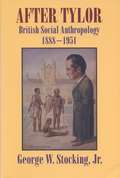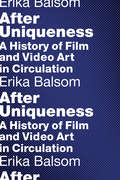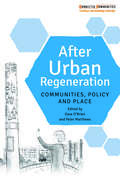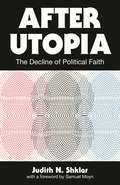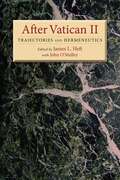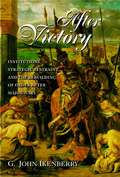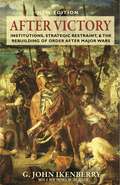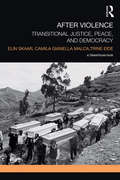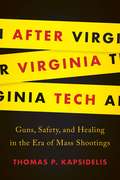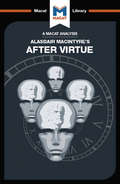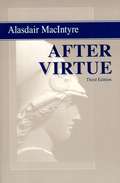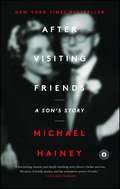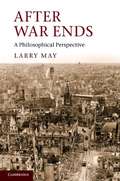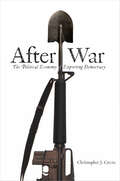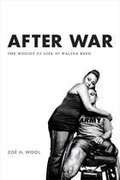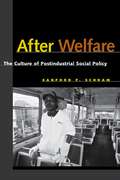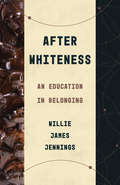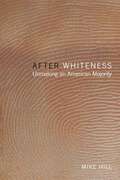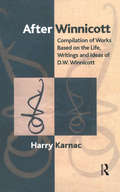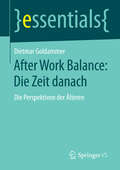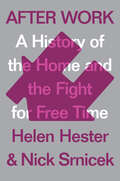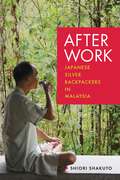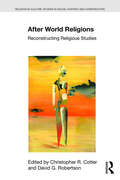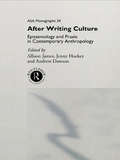- Table View
- List View
After Tylor: British Social Anthropology, 1888-1951
by George W. StockingA sequel to Victorian Anthropology, Stocking's widely acclaimed study of British anthropology and the Darwinian Revolution, After Tylor is the first comprehensive exploration of the intellectual transition that gave rise to modern British social anthropology.
After Uniqueness: A History of Film and Video Art in Circulation (Film and Culture Series)
by Erika BalsomImages have never been as freely circulated as they are today. They have also never been so tightly controlled. As with the birth of photography, digital reproduction has created new possibilities for the duplication and consumption of images, offering greater dissemination and access. But digital reproduction has also stoked new anxieties concerning authenticity and ownership. From this contemporary vantage point, After Uniqueness traces the ambivalence of reproducibility through the intersecting histories of experimental cinema and the moving image in art, examining how artists, filmmakers, and theorists have found in the copy a utopian promise or a dangerous inauthenticity—or both at once. <P><P>From the sale of film in limited editions on the art market to the downloading of bootlegs, from the singularity of live cinema to video art broadcast on television, Erika Balsom investigates how the reproducibility of the moving image has been embraced, rejected, and negotiated by major figures including Stan Brakhage, Leo Castelli, and Gregory Markopoulos. Through a comparative analysis of selected distribution models and key case studies, she demonstrates how the question of image circulation is central to the history of film and video art. After Uniqueness shows that distribution channels are more than neutral pathways; they determine how we encounter, interpret, and write the history of the moving image as an art form.
After Urban Regeneration: Communities, Policy and Place (Connected Communities)
by Dave O'Brien and Peter MatthewsAfter Urban Regeneration is a comprehensive study of contemporary trends in urban policy and planning. Leading scholars come together to create a key contribution to the literature on gentrification, with a focus on the history and theory of community in urban policy. Engaging with debates as to how urban policy has changed, and continues to change, following the financial crash of 2008, the book provides an essential antidote to those who claim that culture and society can replicate the role of the state. Based on research from the UK Arts and Humanities Research Council’s Connected Communities programme and with a unique set of case studies drawing on artistic and cultural community work, the book will appeal to scholars and students in geography, urban studies, planning, sociology, law and art as well as policy makers and community workers.
After Utopia: The Decline of Political Faith
by Judith N. ShklarA political philosophy classic from one of the foremost political thinkers of the twentieth centuryAfter Utopia was Judith Shklar’s first book, a harbinger of her renowned career in political philosophy. Throughout the many changes in political thought during the last half century, this important work has withstood the test of time. In After Utopia, Shklar explores the decline of political philosophy, from Enlightenment optimism to modern cultural despair, and she offers a critical, creative analysis of this downward trend. She looks at Romantic and Christian social thought, and she shows that while the present political fatalism may be unavoidable, the prophets of despair have failed to explain the world they so dislike, leaving the possibility of a new and vigorous political philosophy. With a foreword by Samuel Moyn, examining After Utopia’s continued relevance, this current edition introduces a remarkable synthesis of ideas to a new generation of readers.
After Vatican II: Trajectories and Hermeneutics
by James L. HeftSince the closing of Vatican II (1962-1965) nearly fifty years ago, several multivolume studies have detailed how the bishops at the council debated successive drafts and finally approved the sixteen documents published as the proceedings of the council. However, opinions vary, sometimes sharply, about the implications of Vatican II. This volume explores the major flashpoints.Contributors:John ConnellyMassimo FaggioliJames L. HeftM. Cathleen KavenyJoseph A. KomonchakJohn O'MalleyFrancis A. SullivanDarlene Fozard WeaverRobin Darling Young
After Victory: Institutions, Strategic Restraint, and the Rebuilding of Order After Major Wars
by G. John IkenberryThe end of the Cold War was a "big bang" reminiscent of earlier moments after major wars, such as the end of the Napoleonic Wars in 1815 and the end of the World Wars in 1919 and 1945. Here John Ikenberry asks the question, what do states that win wars do with their newfound power and how do they use it to build order? In examining the postwar settlements in modern history, he argues that powerful countries do seek to build stable and cooperative relations, but the type of order that emerges hinges on their ability to make commitments and restrain power.The author explains that only with the spread of democracy in the twentieth century and the innovative use of international institutions--both linked to the emergence of the United States as a world power--has order been created that goes beyond balance of power politics to exhibit "constitutional" characteristics. The open character of the American polity and a web of multilateral institutions allow the United States to exercise strategic restraint and establish stable relations among the industrial democracies despite rapid shifts and extreme disparities in power.Blending comparative politics with international relations, and history with theory, After Victory will be of interest to anyone concerned with the organization of world order, the role of institutions in world politics, and the lessons of past postwar settlements for today. It also speaks to today's debate over the ability of the United States to lead in an era of unipolar power.
After Victory: Institutions, Strategic Restraint, and the Rebuilding of Order after Major Wars, New Edition (Princeton Studies In International History And Politics Ser. #161)
by G. John IkenberryThe end of the Cold War was a "big bang" reminiscent of earlier moments after major wars, such as the end of the Napoleonic Wars in 1815 and the end of the world wars in 1919 and 1945. But what do states that win wars do with their newfound power, and how do they use it to build order? In After Victory, John Ikenberry examines postwar settlements in modern history, arguing that powerful countries do seek to build stable and cooperative relations, but the type of order that emerges hinges on their ability to make commitments and restrain power. He explains that only with the spread of democracy in the twentieth century and the innovative use of international institutions—both linked to the emergence of the United States as a world power—has order been created that goes beyond balance of power politics to exhibit "constitutional" characteristics. Blending comparative politics with international relations, and history with theory, After Victory will be of interest to anyone concerned with the organization of world order, the role of institutions in world politics, and the lessons of past postwar settlements for today.
After Victory: Institutions, Strategic Restraint, and the Rebuilding of Order after Major Wars, New Edition - New Edition (Princeton Studies in International History and Politics #161)
by G. John IkenberryThe end of the Cold War was a "big bang" reminiscent of earlier moments after major wars, such as the end of the Napoleonic Wars in 1815 and the end of the world wars in 1919 and 1945. But what do states that win wars do with their newfound power, and how do they use it to build order? In After Victory, John Ikenberry examines postwar settlements in modern history, arguing that powerful countries do seek to build stable and cooperative relations, but the type of order that emerges hinges on their ability to make commitments and restrain power. He explains that only with the spread of democracy in the twentieth century and the innovative use of international institutions—both linked to the emergence of the United States as a world power—has order been created that goes beyond balance of power politics to exhibit "constitutional" characteristics. Blending comparative politics with international relations, and history with theory, After Victory will be of interest to anyone concerned with the organization of world order, the role of institutions in world politics, and the lessons of past postwar settlements for today.
After Violence: Transitional Justice, Peace, and Democracy
by Elin Skaar Camila Gianella Malca Trine EideAfter Violence: Transitional Justice, Peace, and Democracy examines the effects of transitional justice on the development of peace and democracy. Anticipated contributions of transitional justice mechanisms are commonly stated in universal terms, with little regard for historically specific contexts. Yet a truth commission, for example, will not have the same function in a society torn by long-term civil war or genocide as in a society emerging from authoritarian repression. Addressing trials, reparations, truth commissions, and amnesties, the book systematically addresses the experiences of four very different contemporary transitional justice cases: post-authoritarian Uruguay and Peru and post-conflict Rwanda and Angola. Its analysis demonstrates that context is a crucial determinant of the impact of transitional justice processes, and identifies specific contextual obstacles and limitations to these processes. The book will be of much interest to scholars in the fields of transitional justice and peacebuilding, as well as students generally concerned with human rights and democratisation.
After Virginia Tech: Guns, Safety, and Healing in the Era of Mass Shootings
by Thomas P. KapsidelisIn what has become the era of the mass shooting, we are routinely taken to scenes of terrible violence. Often neglected, however, is the long aftermath, including the efforts to effect change in the wake of such tragedies. On April 16, 2007, thirty-two Virginia Tech students and professors were murdered. Then the nation’s deadliest mass shooting by a lone gunman, the tragedy sparked an international debate on gun culture in the United States and safety on college campuses. Experiencing profound grief and trauma, and struggling to heal both physically and emotionally, many of the survivors from Virginia Tech and their supporters put themselves on the front lines to advocate for change. Yet since that April, large-scale gun violence has continued at a horrifying pace.In After Virginia Tech, award-winning journalist Thomas Kapsidelis examines the decade after the Virginia Tech massacre through the experiences of survivors and community members who have advocated for reforms in gun safety, campus security, trauma recovery, and mental health. Undaunted by the expansion of gun rights, they have continued their national leadership despite an often-hostile political environment and repeated mass violence. Kapsidelis also focuses on the trauma suffered by police who responded to the shootings, and the work by chaplains and a longtime police officer to create an organization dedicated to recovery. The stories Kapsidelis tells here show how people and communities affected by profound loss ultimately persevere long after the initial glare and attention inevitably fade. Reaching beyond policy implications, After Virginia Tech illuminates personal accounts of recovery and resilience that can offer a ray of hope to millions of Americans concerned about the consequences of gun violence.
After Virtue
by Jon W. ThompsonAlasdair MacIntyre’s 1981 After Virtue was a ground-breaking contribution to modern moral philosophy. Dissatisfied with the major trends in the moral philosophy of his time, MacIntyre argued that modern moral discourse had no real rational basis. Instead, he suggested, if one wanted to build a rational theory for morality and moral actions, one would have to go all the way back to Aristotle. To build his arguments – which are widely acknowledged to be as important as they are complex – MacIntyre relies on two critical thinking skills above all others: evaluation and interpretation. The primary goal of evaluation is to judge the strength or weakness of arguments, asking how acceptable a given line of reasoning is, and how adequate it is to the situation. In After Virtue, MacIntyre applies incisive evaluation skills to major positions and figures in moral philosophy one after the other – showing how and why Aristotle’s template remains a stronger way of considering moral questions. Throughout this process, MacIntyre also relies on his interpretative skills. As MacIntyre knows, clarifying meanings, questioning definitions, and laying down definitions of his key terms is as vital to advancing his arguments as it is to evaluating those of other philosophers.
After Virtue: A Study in Moral Theory (3rd edition)
by Alasdair MacintyreIn this classic work, Alasdair MacIntyre examines the historical and conceptual roots of the idea of virtue, diagnoses the reasons for its absence in personal and public life, and offers a tentative proposal for its recovery.
After Visiting Friends
by Michael HaineyA decade in the writing, the haunting story of a son's quest to understand the mystery of his father's death--a universal memoir about the secrets families keep and the role they play in making us who we are.Michael Hainey had just turned six when his uncle knocked on his family's back door one morning with the tragic news: Bob Hainey, Michael's father, was found alone near his car on Chicago's North Side, dead, of an apparent heart attack. Thirty-five years old, a young assistant copy desk chief at the Chicago Sun-Times, Bob was a bright and shining star in the competitive, hard-living world of newspapers, one that involved booze-soaked nights that bled into dawn. And then suddenly he was gone, leaving behind a young widow, two sons, a fractured family--and questions surrounding the mysterious nature of his death that would obsess Michael throughout adolescence and long into adulthood. Finally, roughly his father's age when he died, and a seasoned reporter himself, Michael set out to learn what happened that night. Died "after visiting friends," the obituaries said. But the details beyond that were inconsistent. What friends? Where? At the heart of his quest is Michael's all-too-silent, opaque mother, a woman of great courage and tenacity--and a steely determination not to look back. Prodding and cajoling his relatives, and working through a network of his father's buddies who abide by an honor code of silence and secrecy, Michael sees beyond the long-held myths and ultimately reconciles the father he'd imagined with the one he comes to know--and in the journey discovers new truths about his mother. A stirring portrait of a family and its legacy of secrets, After Visiting Friends is the story of a son who goes in search of the truth and finds not only his father, but a rare window into a world of men and newspapers and fierce loyalties that no longer exists.
After War Ends
by Larry MayThere is extensive discussion in current Just War literature about the normative principles which should govern the initiation of war (jus ad bellum) and also the conduct of war (jus in bello), but this is the first book to treat the important and difficult issue of justice after the end of war. Larry May examines the normative principles which should govern post-war practices such as reparations, restitution, reconciliation, retribution, rebuilding, proportionality and the Responsibility to Protect. He discusses the emerging international law literature on transitional justice and the problem of moving from a position of war and possible mass atrocity to a position of peace and reconciliation. He questions the Just War tradition, arguing that contingent pacifism is most in keeping with normative principles after war ends. His discussion is richly illustrated with contemporary examples and will be of interest to students of political and legal philosophy, law and military studies.
After War: The Political Economy of Exporting Democracy
by Christopher J. CoyneParts of this book were presented at the Economics Seminar Series at West Virginia University; the Workshop in Applied Political Economy at San Jose State University; The Mercatus Center at George Mason University
After War: The Weight of Life at Walter Reed
by Zoë H. WoolIn After War Zoë H. Wool explores how the American soldiers most severely injured in the Iraq and Afghanistan wars struggle to build some kind of ordinary life while recovering at Walter Reed Army Medical Center from grievous injuries like lost limbs and traumatic brain injury. Between 2007 and 2008, Wool spent time with many of these mostly male soldiers and their families and loved ones in an effort to understand what it's like to be blown up and then pulled toward an ideal and ordinary civilian life in a place where the possibilities of such a life are called into question. Contextualizing these soldiers within a broader political and moral framework, Wool considers the soldier body as a historically, politically, and morally laden national icon of normative masculinity. She shows how injury, disability, and the reality of soldiers' experiences and lives unsettle this icon and disrupt the all-too-common narrative of the heroic wounded veteran as the embodiment of patriotic self-sacrifice. For these soldiers, the uncanny ordinariness of seemingly extraordinary everyday circumstances and practices at Walter Reed create a reality that will never be normal.
After Welfare: The Culture of Postindustrial Social Policy
by Sanford F. SchramDo contemporary welfare policies reflect the realities of the economy and the needs of those in need of public assistance, or are they based on outdated and idealized notions of work and family life? Are we are moving from a "war on poverty" to a "war against the poor?" In this critique of American social welfare policy, Sanford F. Schram explores the cultural anxieties over the putatively deteriorating "American work ethic," and the class, race, sexual and gender biases at the root of current policy and debates. Schram goes beyond analyzing the current state of affairs to offer a progressive alternative he calls "radical incrementalism," whereby activists would recreate a social safety net tailored to the specific life circumstances of those in need. His provocative recommendations include a series of programs aimed at transcending the prevailing pernicious distinction between "social insurance" and "public assistance" so as to better address the needs of single mothers with children. Such programs could include "divorce insurance" or even some form of "pregnancy insurance" for women with no means of economic support. By pushing for such programs, Schram argues, activists could make great strides towards achieving social justice, even in today's reactionary climate.
After Whiteness: An Education in Belonging (Theological Education between the Times)
by Willie James JenningsOn forming people who form communion Theological education has always been about formation: first of people, then of communities, then of the world. If we continue to promote whiteness and its related ideas of masculinity and individualism in our educational work, it will remain diseased and thwart our efforts to heal the church and the world. But if theological education aims to form people who can gather others together through border-crossing pluralism and God-drenched communion, we can begin to cultivate the radical belonging that is at the heart of God&’s transformative work.In this inaugural volume of the Theological Education between the Times series, Willie James Jennings shares the insights gained from his extensive experience in theological education, most notably as the dean of a major university&’s divinity school—where he remains one of the only African Americans to have ever served in that role. He reflects on the distortions hidden in plain sight within the world of education but holds onto abundant hope for what theological education can be and how it can position itself at the front of a massive cultural shift away from white, Western cultural hegemony. This must happen through the formation of what Jennings calls erotic souls within ourselves—erotic in the sense that denotes the power and energy of authentic connection with God and our fellow human beings.After Whiteness is for anyone who has ever questioned why theological education still matters. It is a call for Christian intellectuals to exchange isolation for intimacy and embrace their place in the crowd—just like the crowd that followed Jesus and experienced his miracles. It is part memoir, part decolonial analysis, and part poetry—a multimodal discourse that deliberately transgresses boundaries, as Jennings hopes theological education will do, too.
After Whiteness: Unmaking an American Majority (Cultural Front #1)
by Mike HillView the Table of Contents.Read the Introduction. "Beautifully written and rigorously argued, After Whiteness is the most important theoretical statement on white racial formation since ‘whiteness studies' began its current academic sojourn. By reading debates about multiculturalism, ethnicity, and the desire for difference as part of the material practices of the U.S. university system, it engages questions of race, humanistic inquiry, intellectual labor, and the democratic function of critical thought. The result is a critically nuanced analysis that promises to solidify Mike Hill's reputation as one of the finest thinkers of his generation."-Robyn Wiegman, Duke University "Mike Hill's After Whiteness is an important, provocative and timely book."-Against the Current "A lucid, fiercely argued, brilliantly conceived, richly provocative work in an emergent and growing area of cultural studies. After Whiteness sets new directions in American literary and cultural studies, and will become a landmark in the field."-Sacvan Bercovitch, Harvard University"Americanists across the disciplines will find Hill's analysis insightful and brilliant. A must for any scholar who wishes to, in Ralph Ellison's words, ‘go to the territory.'"-Sharon Holland, University of Illinois at ChicagoAs each new census bears out, the rise of multiracialism in the United States will inevitably result in a white minority. In spite of the recent proliferation of academic studies and popular discourse on whiteness, however, there has been little discussion of the future: what comes after whiteness? On the brink of what many are now imagining as a post-white American future, it remains a matter of both popular and academic uncertainty as to what will emerge in its place.After Whiteness aims to address just that, exploring the remnants of white identity to ask how an emergent post-white national imaginary figure into public policy issues, into the habits of sexual intimacy, and into changes within public higher education. Through discussions of the 2000 census and debates over multiracial identity, the volatile psychic investments that white heterosexual men have in men of color-as illustrated by the Christian men's group the Promise Keepers and the neo-fascist organization the National Alliance-and the rise of identity studies and diversity within the contemporary public research university, Mike Hill surveys race among the ruins of white America. At this crucial moment, when white racial change has made its ambivalent cultural debut, Hill demonstrates that the prospect of an end to whiteness haunts progressive scholarship on race as much as it haunts the paranoid visions of racists.
After Winnicott: Compilation of Works Based on the Life, Writings and Ideas of D.W. Winnicott
by Harry KarnacThis bibliography is based on the plethora of ideas introduced into the psychoanalytic lexicon by Donald Woods Winnicott. It demonstrates amply how wide the range is of Winnicott scholarship and facilitates post-Freudian Bion and Winnicott studies.
After Work Balance: Die Perspektiven der Älteren (essentials)
by Dietmar GoldammerWir werden immer älter, und viele Menschen sind beim Eintritt in den Ruhestand noch fit und möchten eine Tätigkeit ausüben, die ihnen Freude bereitet und für andere Nutzen stiftet. Dietmar Goldammer klärt auf, regt an und mobilisiert. Unterschiedliche individuelle Voraussetzungen erfordern unterschiedliche Strategien für eine veränderte Lebenssituation der älteren Menschen, und der Autor informiert mit zahlreichen Beispielen darüber, wie andere diese Situation erfolgreich gelöst haben. Zuvor stellt er dar, wie man sich auf den Ruhestand vorbereiten kann, welche Möglichkeiten es gibt und worauf man achten sollte. Auf diese Weise wird deutlich, dass man auch nach der Pensionierung noch erstrebenswerte Ziele erreichen kann.
After Work: A History of the Home and the Fight for Free Time
by Helen Hester Nick SRNICEKA timely manifesto for a feminist post-work politicsDoes it ever feel like you have no free time? You come home after work and instead of finding a space of rest and relaxation, you&’re confronted by a pile of new tasks to complete – cooking, cleaning, looking after the kids, and so on.In this ground-breaking book, Helen Hester and Nick Srnicek lay out how unpaid work in our homes has come to take up an ever-increasing portion of our lives – how the vacuum of free time has been taken up by vacuuming. Examining the history of the home over the past century – from running water to white goods to smart homes – they show how repeated efforts to reduce the burden of this work have faced a variety of barriers, challenges, and reversals.Charting the trajectory of our domestic spaces over the past century, Hester and Srnicek consider new possibilities for the future, uncovering the abandoned ideas of anti-housework visionaries and sketching out a path towards real free time for all, where everyone is at liberty to pursue their passions, or do nothing at all. It will require rethinking our living arrangements, our expectations and our cities.
After Work: Japanese Silver Backpackers in Malaysia
by Shiori ShakutoAn ethnography of “silver backpackers” that offers a feminist perspective on what makes a good retirement in contemporary societiesThe moniker “silver backpackers” refers to Japanese couples who, in their mid-fifties to seventies, move to Malaysia to enjoy their retirement. Recent scholarship on Japan has revealed how the gendered division of labor impacts the lives of middle-class workers and their families. But how do cultural values live on—or change—when these professionals retire from work, move on from identities built through salaried careers, and embark on a new phase of life? After Work takes up this question to focus on what comes after work, and in the process, expands our understanding of aging, gender, migration, and the future of work.Based on fifteen months of fieldwork in Kuala Lumpur and employing a transnational feminist framework, After Work investigates moments of difference in the experiences of older women and men to examine patriarchal conversations that dominate ideas about contemporary retirement. Shiori Shakuto argues that anxiety around self and belonging in retirement are instigated by the capitalist labor regime and the discourse of successful aging, both of which devalue nonremunerated activities conducted at home. What is needed instead, she contends, is a re-valuation of key domestic activities—from caring for children to pursuing individual hobbies—so that “life” can be appreciated in its entirety.Shakuto also takes into account the fact that this transnational retirement is set in Malaysia—a nation that Japan occupied during World War II and thereafter subject to decades of economic investment and resource exploitation by Japanese corporations. Highlighting how historical, cultural, and racialized complexities entangle with intimate relations in increasingly connected Asian countries while simultaneously acknowledging how the boundaries between work and life blur ever more in contemporary society, After Work complicates our perceptions of aging and a “good” retirement as well as our understandings of gender, migration, and the future of work as we know it.
After World Religions: Reconstructing Religious Studies (Religion in Culture)
by David G. Robertson Christopher R CotterThe World Religions Paradigm has been the subject of critique and controversy in Religious Studies for many years. After World Religions provides a rationale for overhauling the World Religions curriculum, as well as a roadmap for doing so. The volume offers concise and practical introductions to cutting-edge Religious Studies method and theory, introducing a wide range of pedagogical situations and innovative solutions. An international team of scholars addresses the challenges presented in their different departmental, institutional, and geographical contexts. Instructors developing syllabi will find supplementary reading lists and specific suggestions to help guide their teaching. Students at all levels will find the book an invaluable entry point into an area of ongoing scholarly debate.
After Writing Culture: Epistemology and Praxis in Contemporary Anthropology (ASA Monographs)
by Andrew DawsonThis collection addresses the theme of representation in anthropology. Its fourteen articles explore some of the directions in which contemporary anthropology is moving, following the questions raised by the "writing culture" debates of the 1980s.It includes discussion of issues such as:* the concept of caste in Indian society* scottish ethnography* how dreams are culturally conceptualised* representations of the family* culture as conservation* gardens, theme parks and the anthropologist in Japan* representation in rural Japan* people's place in the landscape of Northern Australia* representing identity of the New Zealand Maori.
